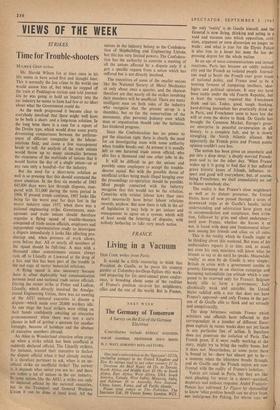VIEWS OF THE WEEK
STRIKES
Time for Trouble-shooters
MAURICE GENT writes: Mr. Harold Wilson for at least once in his life seems to have acted first and thought later. This is normally the last crime in the world one would accuse him of, but when he stepped off the train at Paddington station and-told journal- ists he was going to hold an inquiry into the car industry he seems to have had few or no ideas about what the Government could do.
As the week progressed it became clear to everybody involved that there might well have to be both a short- and a long-term solution. In the long term there is a case for a report of the Devlin type, which would draw some pretty devastating comparisons between, the perform- ances of different companies in the labour- relations field, and cause a few management heads to roll. An analysis of the trade unions would throw up so many anomalies between the structures of the multitude of unions that it would hasten the day of a single union—or at any rate only a handful—for the industry.
But the need for a short-term solution as well is so pressing that this should command the most attention. In the first six months of 1965 645,000 days were lost through disputes, com- pared with 311,000 during the same period in 1964. If present trends continue, 1965 looks like being far the worst year for days lost in the motor industry since 1957, when there was a national engineering strike. Government, man- agement and trade unions should therefore organise a flying squad of trouble-shooters composed of trade union officials, employers and independent representatives ready to investigate a dispute immediately it looks like affecting pro- duction and, when pressure of work allows, even before that. All or nearly all members of the squad should be full-time. A man with a thousand other commitments cannot always rush off to Llanelly or Linwood at the drop of a hat, and this has been part of the trouble in the sad saga of motor industrial relations.
A flying squad is also necessary because there is often deplorably bad communication between local and national trade union officials. During the recent strike at Fisher and Ludlow, Llanelly, which directly involved the Amalga- mated Engineering Union, there was no meeting of the AEU national executive to discuss a dispute—which made over 20,000 workers idle. At one stage the local strikers were sitting on their hands confidently awaiting an executive pronouncement when there was not a cat's chance in hell of getting a quorum for another fortnight, because of holidays and the absence of executive members abroad, An Alice in Wonderland situation often crops up when a strike which has been unofficial is suddenly declared official. The Llanelly strikers, for instance, wanted their executive to declare the dispute official when it had already started. It is therefore pertinent to ask, when is an un- official strike an unofficial strike? The answer is, it depends what union you are in: and there are rather a lot of unions in the car industry. In some unions like the AEU, a strike can only be declared official by the national executive, but in the Transport and General Workers Union it can be done at local level. All the unions in the industry belong to the Confedera- tion of Shipbuilding and Engineering Unions, but this has very limited powers, The Confedera- tion has the authority to convene a meeting of all the unions affected by a dispute only if it gets a specific request from a union which has suffered but is not directly involved.
The executives of some of the smaller unions like the National Society of Metal Mechanics sit only about once a quarter, and the chances therefore are that nearly all the strikes involving their members will be unofficial. There are many intelligent men on both sides of the industry who recognise that the present set-up is a shambles, but so far the conservatism of the movement, plus personal jealousy over which man or organisation should take the initiative, has hindered progress.
Since the Confederation has no power to put the situation right there is clearly the need for an investigating team with some authority when trouble breaks out. At present it is usually left to one harassed trade union official, who also has a thousand and one other jobs to do.
It will be difficult to get the unions and possibly some, employers to accept the trouble- shooter squad. But with the possible threat of unofficial strikes being made illegal hanging over the proceedings co-operation should be possible. Most people connected with the industry recognise that this would not be the solution. Countries with stricter labour laws than ours don't necessarily have better labour relations records, anyhow. But now there is talk in the air of legislation it may help to get unions and management to agree on a system, which will at least avoid the festering of disputes, with nobody bothering to take very much notice.






























 Previous page
Previous page